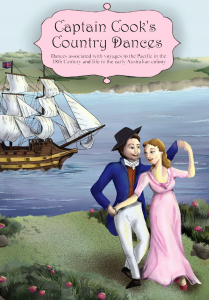Dancing in fetters:
the culture of convict dance
Discover a completely different aspect of convict life.
When we think of convicts, we don’t tend to think of music and dance, but dance was an integral part of everyday life and one of the most popular forms of recreation in the early colony. Convicts danced to escape the drudgery and harshness of their existence. It provided social cohesion, a sense of belonging and cultural identity in a strange new land.
Dancing was a prime pastime for the underclasses in 18th and 19th century Britain and Ireland where the majority of convicts originated. Once convicted, prisoners danced in prisons and on the hulks while they awaited transportation – some danced to the music of their jangling chains.
A number of enlightened surgeons encouraged convicts to dance on the long voyage to the colony, knowing it was good for their health and “tranquility of mind”. In the colony dancing remained a popular pursuit – even if it was sometimes associated with illegal activities.
The exhibition Dancing in fetters: the culture of convict dance was developed by Moreton Bay Regional Council in partnership with dance historian, Heather Clarke, and held at the Redcliffe Museum, Brisbane from 25 August 2018 – 18 November 2018. Based on doctoral research undertaken at QUT.
Programme of events.
Redcliffe Museum
75 Anzac Avenue, Redcliffe
6.30pm – 8.30pm
24 August 2018.
Curator’s talk : Researching convict dance
01 September 2018 10.30am – 11.30am
Come and listen to the intriguing and fascinating story of convict dance by dance teacher and historian Dr Heather Clarke. Heather has been actively involved in early Australian colonial dance for over three decades and will provide various workshops throughout the exhibition. This talk will focus on the motivation for her doctoral research and the where, when & why of convict dance.
Heritage talk: Wine, women and song in convict times.
Wednesday 12 September 2018. 10.30am – 11.30am
Dr Jennifer Harrison has been researching convicts for over a generation and is fascinated with the 3000 or so recidivists who were transported to Moreton Bay after committing further crime in Sydney. Here the entire settlement was a gaol so opportunities for dancing and singing were very few, but some enjoyed the occasional frivolous moments after being arrested.
Dance like a convict: workshop for kids
Wednesday 26 September 201. 10.30am – 11.30am
Experience the delights of dancing as a convict. Jigs, reels and hornpipes are fun and easy to learn. This 1 hour workshop will introduce these lively dances with music supplied by Phillip’s Dog. Ages 5-15. Bookings essential.
Heritage Talk: Australia’s First Professional Actor, James Laurence
Tuesday 16 October, 2018. 10.30am – 11:30am
Writer and historian Rob Wills will talk about the exciting theatrical – and criminal – life of Australia’s first professional actor, James Laurence. Among his many incarcerations James spent 7 years at Moreton Bay under the notorious Captain Logan. During his periods of freedom, he organised concerts in different countries and cities. He was not a great singer or actor – he got very bad reviews – but he was keen!
Afternoon concert and high tea
Dance was an important element in colonial social life. It was a chance to mix with high society or a way to unwind and relax. Come along and join us for a high tea accompanied by music, song and dance from the band Phillip’s Dog. Bookings essential.
Sunday 28 October 2018. 2.00pm – 3.30pm
Convict Jam!
Saturday 03 November 2018. 10.30am – 11.30am
Musicians and singers are invited to a Saturday morning jam at the Redcliffe Museum. Come play by ear or follow a tune book provided. Music will be led by Phillip’s Dog. Coffee and tea available. Free event, bookings essential.
All events supported by bushtraditions.org
Reviews
The exhibition was covered by ABC radio, and reviewed in Griffith University’s The Source News and the Redcliffe Guide.
_____________________________________________________________
Header credit: Lowest life in London. Tom, Jerry, and Logic among the unsophisticated sons and daughters of Nature at ‘All Max’ in the East. Illustration by George Cruikshank (1792 – 1878). ©Trustees of the British Museum
____________________________________________________________







